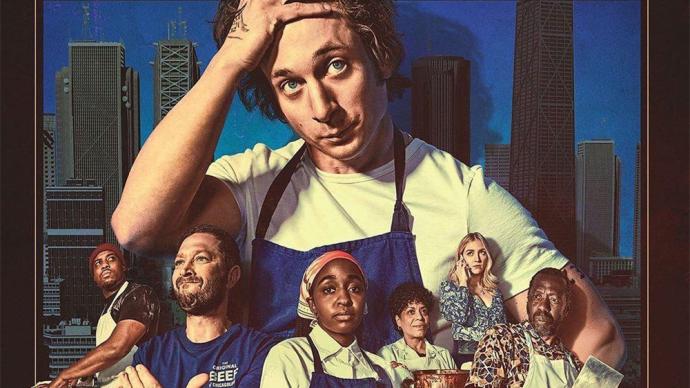
There are two things I don't like about the new Hulu drama "The Bear." First, when the restaurant fell into a serious debt crisis, they suddenly found a huge amount of cash in a tin can of ketchup. Crisis is like a dewdrop, when it is illuminated by the warm sun of money, it immediately evaporates and disappears. Second, it's yet another story of a troubled genius white male saving beings and himself. 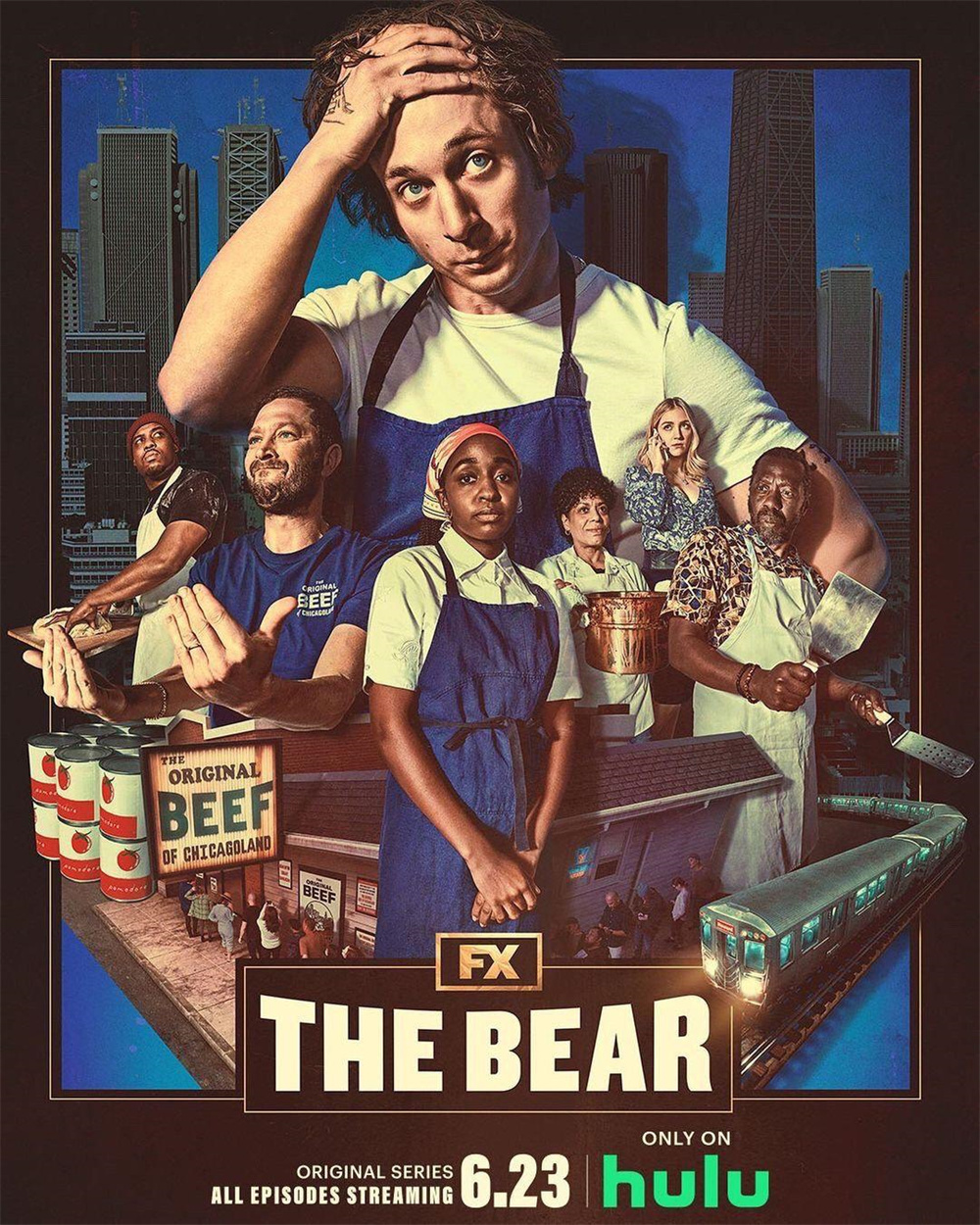
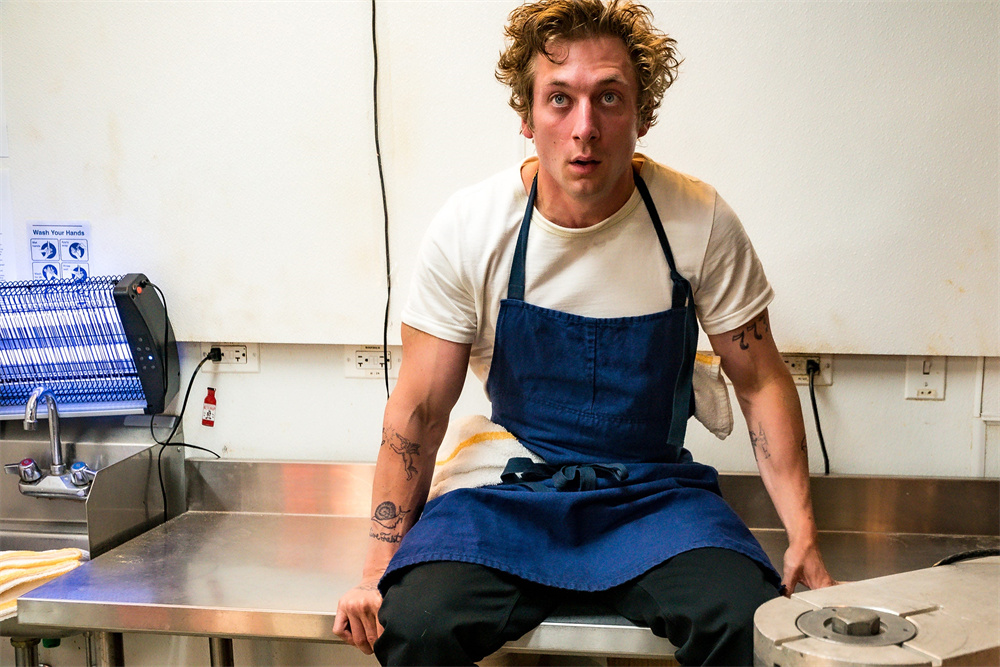
Ritchie and Mike are "white trash" in the usual sense, worn down by debt, alcohol, drug addiction, irresponsibility, and a habit of overdrafting the future. They are always drunk at the moment, living in the old days of "Ghostbusters". Ritchie likes to call people "giant babies", and people around him look at him as if he was cursing himself loudly.
Like this year's high-scoring British drama "This Is Going To Hurt," "The Bear's Restaurant" is a presto of modern life, and it's loud. Everyone in the back kitchen was shouting, the words overlapped, and most of the time, no one could hear what the other was saying. The brakes failed, they couldn't stop themselves, and the urgency seemed to stop, and life would come to a standstill.
Plays like this are a type of noise therapy, fighting fire with fire, allowing the energy of life to dissipate in the constant pounding of yelling and eardrums. It has long gone beyond the scope of venting, not inflating, but letting it leak. Lying on the floor with air leaks, can withstand the impact of the noise wave after wave.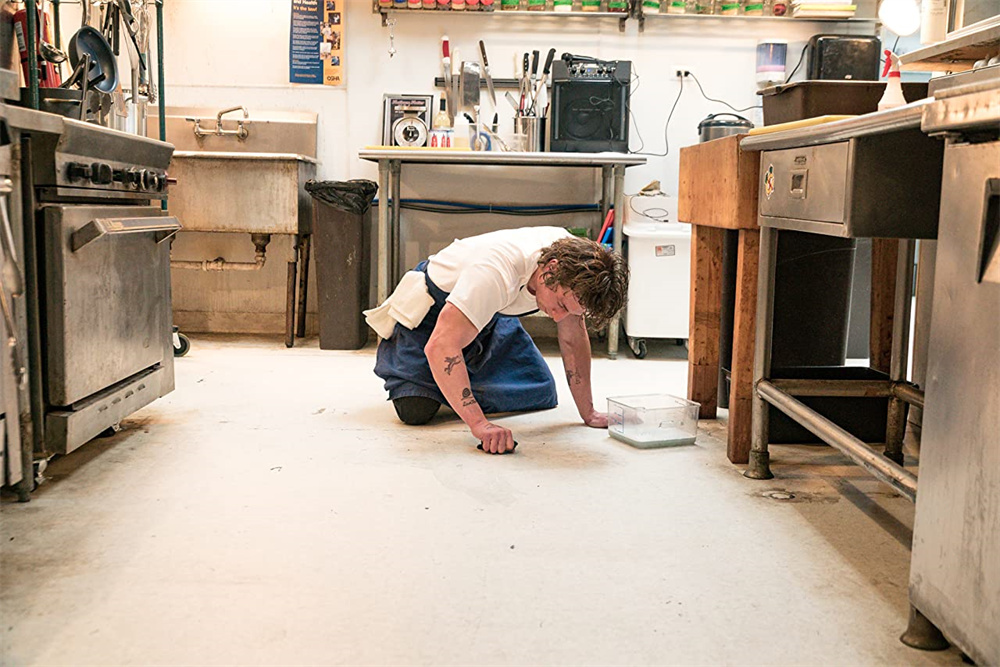
But they are lonely. Because although every day is spent in spittle and burning oil, colleagues have been friends for many years, but they still lack real communication and cannot effectively soothe their loneliness. In-depth communication requires leisure time, and this group of people has been passing through the gates under the urge of the clock, and they have no time to sit down and talk and taste the taste of the food they have made. When this opportunity was rare, everyone was silent. Someone sighed.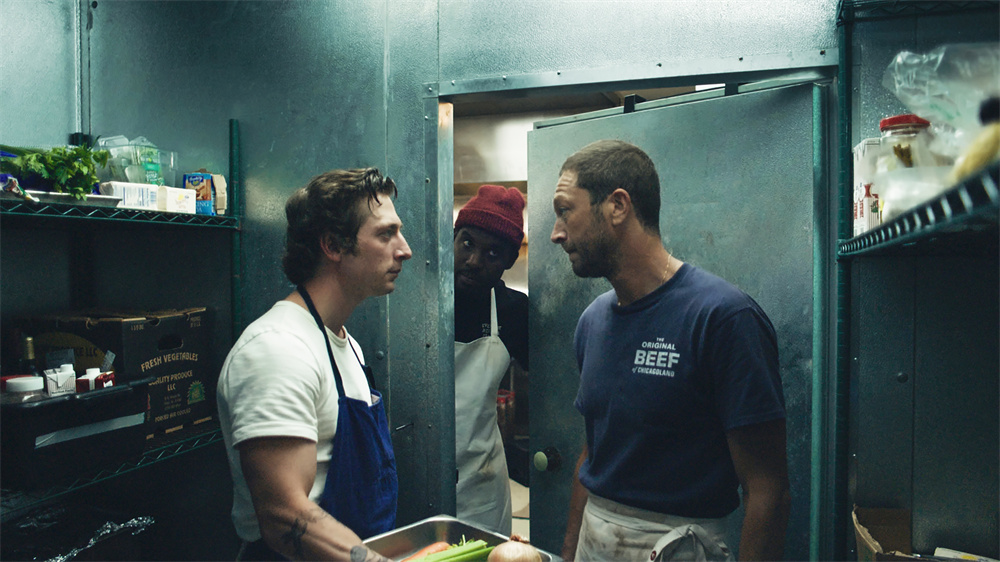
It also has a wonderful effect, and so do the film and television dramas in the same tone. Whether it's Dr. Adam (Ben Whishaw) in "The Pain is Inevitable" or Chef Carmen in "The Bear's Diner", there is a self that wants to escape. They are people with a lack of personality and an uneasy inner pain, so they are doubly attached to their work. Especially important is the working atmosphere. Only in the high pressure of the emergency room or kitchen can they temporarily forget about their problems and feel a silver lining and peace. Give them a quiet environment, and the beasts in their hearts will come out of their cages instead. The only thing that can suppress the inner roar is the louder external noise.
There are too many characters like Carmen and Adam in British and American dramas. They are lone heroes who accidentally broke into the system, closed-minded, and very bad at teamwork. But being forced to do so, the genius descended into the mortal world, and he couldn't become a superman. He could only open his heart, let the good intentions of mortals and their own genius hurt each other, nourish each other, grow together, and reach an ideal situation that is unattainable in reality.
"Listen to your inner voice and know yourself," modern-day favorite meditation and yoga will always tell you. But people with peace of mind lack dramatic conflict, and people like Carmen and Adam are worth seeing. In the conversation like stray bullets on the battlefield, Carmen and his colleagues repeated: "received, received, received", and kept telling each other, "I heard what you said." They try to listen, but are powerless to do it. I want to reach out and pull the other person, but it is always difficult to protect myself.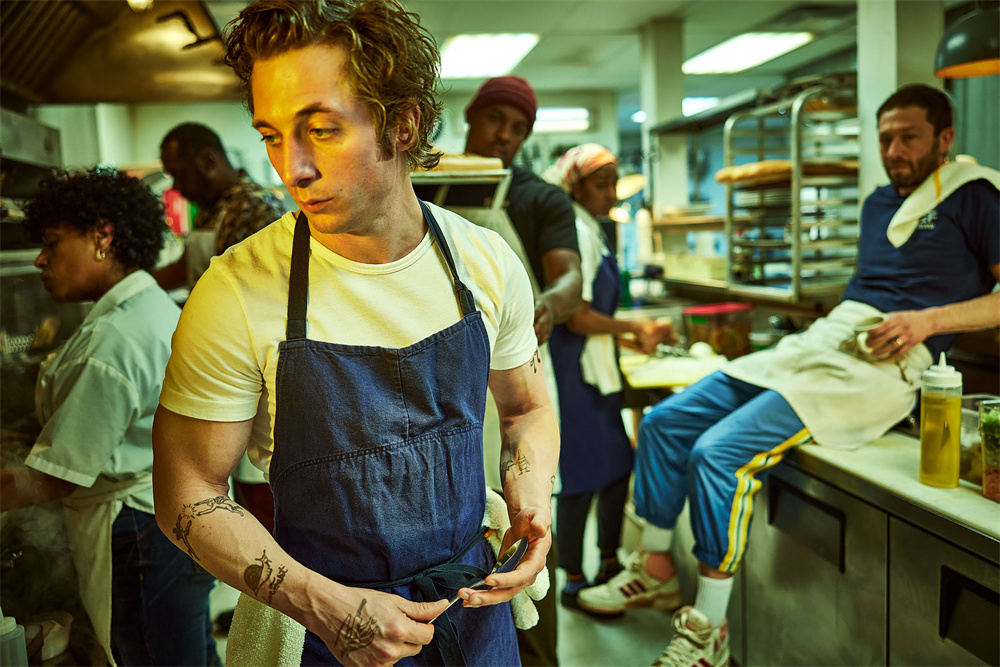
Ritchie is very sensitive to change, always emphasizing the "fragile ecosystem" of this street. Part nostalgia, part instinctual resistance to big capital invading traditional communities. Ritchie had better not change at all. But Mike dies, and his own condescending marriage fails. It's not that he wants to keep things as they are, that things won't change as he wishes. When Debt and Carmen landed in this restaurant against his will, change happened.
Carmen and the young regular army new chef Sidney (Ayew Edvery) bring the process of the French restaurant's back kitchen. These two chefs who have returned to the streets from the "civilized world" dislike the strict hierarchy of the back chefs in high-end restaurants, and appreciate the equality and humanity among the employees here, but they can't stand the bad process and are forced to suffocate by the chaos and disorder. . The reform-fueled backlash erupted in quick-cut footage. The seventh episode of the entire episode in the end contains the team on the verge of collapse.
The goals that Carmen and Sidney set were far too idealistic. They want to solve a problem that no modern enterprise system can solve: the optimal development of both efficiency and personal ability. It also needs to survive and maintain a healthy cash flow to withstand the pressure of large capital expansion.
It may be because the problem is really unsolved that the screenwriter came up with the plot of hiding gold in a tomato jar, which miraculously healed the kitchen on the verge of collapse, so that the next season can be developed. This miracle reversed the foregone conclusion of the bottom-level people of "no matter how hard you try, or you will fail", bringing people the pleasure of gasping for breath.
Otherwise, what can they do? Friendship doesn't make money. If the restaurant goes down, everyone will have to go their separate ways. Elsewhere, there's no room to support former McDonald's employee Marcus (Lionel Boyce)'s experiment in the perfect doughnut. Tina (Lisa Keren-Zayas), the self-respecting eldest sister, will probably only be yelled at and do chores in another, messier kitchen.
The tomato pot saved, more like an old world. People in this world are rougher, foul-mouthed, and far removed from the frailty and hypocrisy of the middle class. Carmen and Rich are hosting a birthday party. Rich's anti-anxiety medication (which has a sleeping effect) accidentally runs into the beverage machine, and the children on the lawn fall asleep. The two got into trouble, but the owner (Carmen's uncle) was very happy, because the annoying "little angels" in the room could finally be quiet for a while.
It's not uncommon to return to children running around the mountains and fields, like cats and dogs, not like today's expensive past. When Richie mumbles about defending Italian heritage, Carmen always reminds him, "You don't even have Italian blood." What Ritchie is trying to defend is actually this raw life force, and it's all in the close-up of the food.
Food determines attitude to life. At this restaurant, chunks of butter melted sizzlingly. Charred on the outside and tender on the inside, cut into extremely thin pink marbled slices. In the clear olive oil, the spices burst into a crisp sound. Donuts are baptized with hot oil, icing sugar and chocolate, attracting the eyes of passersby in the window.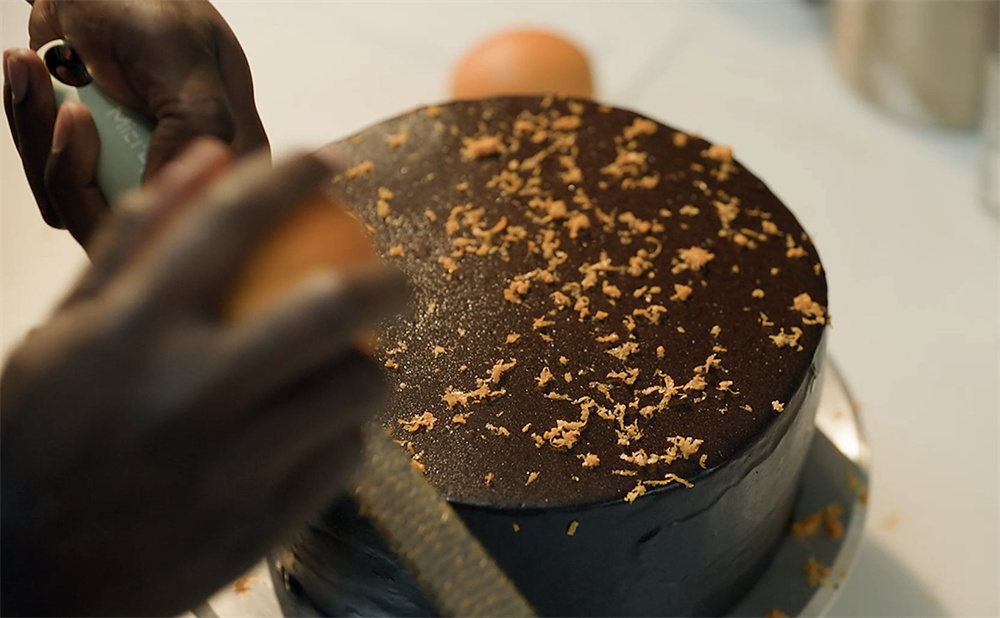
The first season had a sweet, best of both worlds ending, comforting our hearts that were bombarded with noise to the point of exhaustion, fearful that our past lives would be gone and our future was at stake. The runaway doughnut maniacs Marcus and Sidney have both returned. The restaurant has temporarily stepped out of the predicament, hanging up signs that it is temporarily closed and is about to make a wonderful return. Hope there is another season.

The Bear's Restaurant poster
Jeremy Allen White pans from Shameless to a roadside Italian restaurant in Chicago. Lip, whose new name is Carmen, worked at the nation's top French restaurant before taking over the dilapidated restaurant. Carmen is listed as the restaurant's heir after his brother Mike (Joe Bernthal) shoots himself without warning. He wanted to make up for the unhelpful brotherhood and save his brother's last legacy in the world, so he descended from the disciplined heaven's kitchen to the hell's kitchen.
"The Bear's Restaurant" stills
This racially mixed restaurant is an extension of the street and the home of the dead house outside the bedroom. Gangs are clamoring for territory outside. On arcade game day, colorful dead houses lined the streets waiting to enter. In either case, Mike's best friend and restaurant partner Richie (Abon Moss-Bakrach) has a big trick - shoot the guns into the sky to quell all kinds of monsters and monsters.Ritchie and Mike are "white trash" in the usual sense, worn down by debt, alcohol, drug addiction, irresponsibility, and a habit of overdrafting the future. They are always drunk at the moment, living in the old days of "Ghostbusters". Ritchie likes to call people "giant babies", and people around him look at him as if he was cursing himself loudly.
Like this year's high-scoring British drama "This Is Going To Hurt," "The Bear's Restaurant" is a presto of modern life, and it's loud. Everyone in the back kitchen was shouting, the words overlapped, and most of the time, no one could hear what the other was saying. The brakes failed, they couldn't stop themselves, and the urgency seemed to stop, and life would come to a standstill.
Plays like this are a type of noise therapy, fighting fire with fire, allowing the energy of life to dissipate in the constant pounding of yelling and eardrums. It has long gone beyond the scope of venting, not inflating, but letting it leak. Lying on the floor with air leaks, can withstand the impact of the noise wave after wave.

"The Bear's Restaurant" stills
The chaos and hustle and bustle that hits Carmen's first arrival is like a heat wave that can kill you in a second. The clock on the wall kept going, hour after hour, day after day. Everyone found that they had been trapped here for many years, facing many crises every day, but they did not die. Inefficient communication and jokes as a lubricant make this hard life a habit, and people are not only used to the noise, but also very dependent on it.But they are lonely. Because although every day is spent in spittle and burning oil, colleagues have been friends for many years, but they still lack real communication and cannot effectively soothe their loneliness. In-depth communication requires leisure time, and this group of people has been passing through the gates under the urge of the clock, and they have no time to sit down and talk and taste the taste of the food they have made. When this opportunity was rare, everyone was silent. Someone sighed.

"The Bear's Restaurant" stills
The kitchen, like the emergency room, takes care of the most basic needs of people. Life and death and filling your stomach are big things. Only big events will make a loud noise, making people suffer in the rhythm of roaring and suffer from fatigue bombing.It also has a wonderful effect, and so do the film and television dramas in the same tone. Whether it's Dr. Adam (Ben Whishaw) in "The Pain is Inevitable" or Chef Carmen in "The Bear's Diner", there is a self that wants to escape. They are people with a lack of personality and an uneasy inner pain, so they are doubly attached to their work. Especially important is the working atmosphere. Only in the high pressure of the emergency room or kitchen can they temporarily forget about their problems and feel a silver lining and peace. Give them a quiet environment, and the beasts in their hearts will come out of their cages instead. The only thing that can suppress the inner roar is the louder external noise.
There are too many characters like Carmen and Adam in British and American dramas. They are lone heroes who accidentally broke into the system, closed-minded, and very bad at teamwork. But being forced to do so, the genius descended into the mortal world, and he couldn't become a superman. He could only open his heart, let the good intentions of mortals and their own genius hurt each other, nourish each other, grow together, and reach an ideal situation that is unattainable in reality.
"Listen to your inner voice and know yourself," modern-day favorite meditation and yoga will always tell you. But people with peace of mind lack dramatic conflict, and people like Carmen and Adam are worth seeing. In the conversation like stray bullets on the battlefield, Carmen and his colleagues repeated: "received, received, received", and kept telling each other, "I heard what you said." They try to listen, but are powerless to do it. I want to reach out and pull the other person, but it is always difficult to protect myself.

"The Bear's Restaurant" stills
Stress is everywhere, and not just from a crisis-ridden, time-critical production segment (symbolized by that wall clock). And the necessities of modern man—debt. After Mike's death, Carmen is left with a huge debt. Their cousin (not blood related) Richie is a visionary and old-time lamenter who wants to ignore the debt, but how is that possible. Ritchie watched as the bars and old shops on the street disappeared one by one, replaced by chain stores or a more dreadful depression.Ritchie is very sensitive to change, always emphasizing the "fragile ecosystem" of this street. Part nostalgia, part instinctual resistance to big capital invading traditional communities. Ritchie had better not change at all. But Mike dies, and his own condescending marriage fails. It's not that he wants to keep things as they are, that things won't change as he wishes. When Debt and Carmen landed in this restaurant against his will, change happened.
Carmen and the young regular army new chef Sidney (Ayew Edvery) bring the process of the French restaurant's back kitchen. These two chefs who have returned to the streets from the "civilized world" dislike the strict hierarchy of the back chefs in high-end restaurants, and appreciate the equality and humanity among the employees here, but they can't stand the bad process and are forced to suffocate by the chaos and disorder. . The reform-fueled backlash erupted in quick-cut footage. The seventh episode of the entire episode in the end contains the team on the verge of collapse.
The goals that Carmen and Sidney set were far too idealistic. They want to solve a problem that no modern enterprise system can solve: the optimal development of both efficiency and personal ability. It also needs to survive and maintain a healthy cash flow to withstand the pressure of large capital expansion.
It may be because the problem is really unsolved that the screenwriter came up with the plot of hiding gold in a tomato jar, which miraculously healed the kitchen on the verge of collapse, so that the next season can be developed. This miracle reversed the foregone conclusion of the bottom-level people of "no matter how hard you try, or you will fail", bringing people the pleasure of gasping for breath.
Otherwise, what can they do? Friendship doesn't make money. If the restaurant goes down, everyone will have to go their separate ways. Elsewhere, there's no room to support former McDonald's employee Marcus (Lionel Boyce)'s experiment in the perfect doughnut. Tina (Lisa Keren-Zayas), the self-respecting eldest sister, will probably only be yelled at and do chores in another, messier kitchen.
The tomato pot saved, more like an old world. People in this world are rougher, foul-mouthed, and far removed from the frailty and hypocrisy of the middle class. Carmen and Rich are hosting a birthday party. Rich's anti-anxiety medication (which has a sleeping effect) accidentally runs into the beverage machine, and the children on the lawn fall asleep. The two got into trouble, but the owner (Carmen's uncle) was very happy, because the annoying "little angels" in the room could finally be quiet for a while.
It's not uncommon to return to children running around the mountains and fields, like cats and dogs, not like today's expensive past. When Richie mumbles about defending Italian heritage, Carmen always reminds him, "You don't even have Italian blood." What Ritchie is trying to defend is actually this raw life force, and it's all in the close-up of the food.
Food determines attitude to life. At this restaurant, chunks of butter melted sizzlingly. Charred on the outside and tender on the inside, cut into extremely thin pink marbled slices. In the clear olive oil, the spices burst into a crisp sound. Donuts are baptized with hot oil, icing sugar and chocolate, attracting the eyes of passersby in the window.

"The Bear's Restaurant" stills
There is a line that says, "The first bite of a donut is sweet, and the second bite is sad." The poor fill their belly with cola, the intake of carbohydrates and fats will always exceed the standard, and the colorful colors of the food are mostly due to the pigments. They need immediate food comfort, before they can think about tomorrow. They are like wheat being harvested one by one, but who says their lives are not worth making a cliché but wonderful drama?The first season had a sweet, best of both worlds ending, comforting our hearts that were bombarded with noise to the point of exhaustion, fearful that our past lives would be gone and our future was at stake. The runaway doughnut maniacs Marcus and Sidney have both returned. The restaurant has temporarily stepped out of the predicament, hanging up signs that it is temporarily closed and is about to make a wonderful return. Hope there is another season.
Related Posts